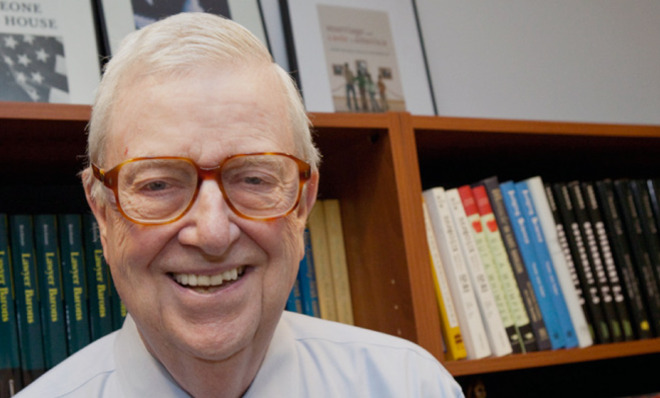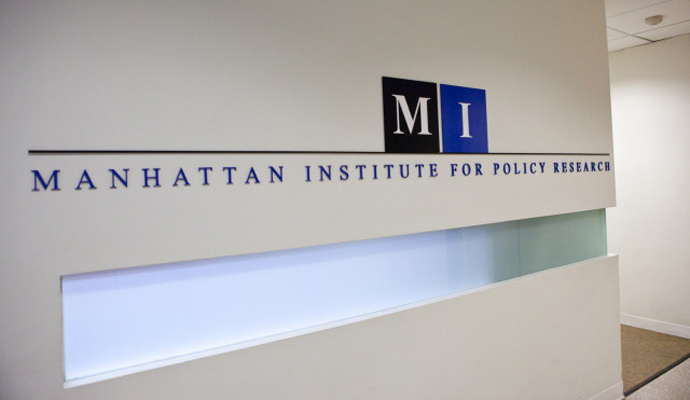The conservative thinker challenging American universities
John Leo, a longtime journalist and columnist, has set his sights on the U.S. higher education system

A free daily email with the biggest news stories of the day – and the best features from TheWeek.com
You are now subscribed
Your newsletter sign-up was successful

John Leo doesn't believe in Fat Studies. He knows they exist; as a keen observer of the trends in higher education, he's followed the proliferation of special interest fields such as fat, disability, and transgender studies for the past 25 years. What bothers Leo is not that special interest studies exist, but that they're considered scholarship.
"Why would you do Fat Studies?" he asks rhetorically. "That's not a college education." He adds, "Why is Disability Studies on campus? It sounds like something a do-good agency should be doing in midtown."
Leo, who just turned 78 and describes himself as a "commenter on the culture," edits Minding the Campus, a website devoted to opinion and commentary on the state of American higher education. Launched in 2007, Minding the Campus is run by the Center for the American University at the Manhattan Institute for Policy Research.
The Week
Escape your echo chamber. Get the facts behind the news, plus analysis from multiple perspectives.

Sign up for The Week's Free Newsletters
From our morning news briefing to a weekly Good News Newsletter, get the best of The Week delivered directly to your inbox.
From our morning news briefing to a weekly Good News Newsletter, get the best of The Week delivered directly to your inbox.
Based in offices opposite Grand Central Station, the Manhattan Institute is arguably the nation's most influential libertarian-conservative think tank. Like an arrhythmia in the heart of liberal New York, Manhattan Institute has over the past 35 years championed public policy innovations, including the broken windows theory of crime prevention, welfare reform of the 1990s, and school vouchers.
Manhattan Institute's initiative regarding higher education is somewhat more modest than those sweeping policy reforms. Leo, who says he is not a "techie," observes the site's analytics "with one eye." "It's a small site, we don't have big numbers yet," he says. "We like to think it's influential even though the numbers aren't large." Leo commissions long essays from writers who are both insiders and outsiders to the American university system. Recent pieces range from Harvey Silvergate on the national campus speech code, to Jim Piereson on the decline of the great state universities. A recent satirical essay by Benjamin Ginsburg parodying the trend toward online courses attracted more than 15,000 Facebook likes.
(More from Narratively: Home on the range)
As editor, Leo says, "The job is to build a site that says something about the modern university: what's right and what's wrong about it." He explains the site's ideology as "essentially a conservative (non-partisan) site, but we reach out now and then to liberal Democrats who disagree."
A free daily email with the biggest news stories of the day – and the best features from TheWeek.com
For people used to reading conservative opinion, the look and feel of the site will be familiar. The emphasis is on substance at the expense of style. There is a minimum of graphics on the site. It might look boring, but the material can be provocative, especially for those who have taken the idea of higher education for granted.
"We think that there's a lot wrong with colleges, and it goes across the board," says Leo. Elite private schools, state schools, small schools, religious schools — all come under fire. Several contributors interviewed praised Leo's ability as an editor as well as his knack for breaking down big ideas into key concepts. For example, his views on affirmative action: "One of the aspects of affirmative action is to pretend that you aren't doing it. You have to believe in 'holistic admissions,' which is really a dishonest term." On the trend towards "cafeteria" curricula: "You can do whatever you want. Major in anything. You don't have to take a history course if you don't want to." On the effect of the 2011 Department of Education's Office for Civil Rights Dear Colleague letter that has lowered the standard of proof in sexual misconduct hearings: "We just think it's a scandal. I don't hesitate to use that word. I think they [college administrators] are responding to pressure to get more convictions. But you can't manufacture convictions where the evidence doesn't warrant it."
These trends in the college atmosphere come, in Leo's estimation, partly out of a need to appeal to students as consumers, and partly out of disdain for the Western tradition. Leo sees diversity and sustainability as cults on campus, cults that extend into the bureaucratic system that is, in turn, driving up college costs. "Note that when they stress diversity and sustainability they're not stressing intellect or achievement or knowledge," he explains. "They're segueing over to social principle rather than learning. I don't know how many people get that. Colleges should not be in the social activism business. You can do that in your spare time."
(More from Narratively: Mission impossible: Mormons take Harlem)
* * *

For many on the political right, the perceived excesses of contemporary liberal arts education have become a well-worn but sad joke. Conservative writers riff on political science professors who mount Che Guevara posters in their offices and laud the benefits of the Cuban agricultural program. Parents might think it strange that courses like "Midwifery and Witchcraft" can be used to fulfill elective requirements for a degree in business administration, but few are outraged. Research has shown that college athletes are held to lower academic standards. Try telling that to college sports fans. They don't care.
A growing number of people are indeed advocating a career path that steers well clear of college. Books, newspapers, and magazine articles with titles like "Is College Worth It?" are increasingly common. Financial considerations are key to these stories. So is the idea of success. Dale J. Stephens, a twenty-something self-described "unschooler" and the author of Hacking Your Education, has spent his young life writing, traveling, and teaching himself. Stephens will launch Uncollege.org this summer. His thesis: college is a waste of time and the talented student can "hack" her own education with a little moxie, the right internships and a library card.
So it's easy to make fun of the American university or dismiss it as no longer necessary. Engaging with its problems, on the other hand, takes tenacity, conviction, and a resistance to cynicism. Most importantly, you have to believe the university offers something worth saving.
(More from Narratively: The conservative next door)
* * *
Leo grew up in Teaneck, New Jersey, in a "mixed" household. His mother was an Italian liberal Democrat; his father an Irish conservative Republican. "They trudged to polls every November to cancel out each other's vote," Leo observes.
As a teenager, Leo commuted from New Jersey to Regis High School, the prestigious private Jesuit prep school in Manhattan. From there he went to the University of Toronto, where he studied philosophy and English and edited one of the school's newspapers. He thought about going to graduate school but "rejected that" because he wasn't sure what he wanted to do. He was, however, attracted to reporting. "After graduation I just wandered into the local newspaper office in Hackensack, The Bergen Record, and said 'You got any jobs?'" he recalls. "And they said, 'Sit down.' They had me doing obits right away. That's how I drifted into journalism."
From The Bergen Record, Leo moved to Iowa to edit The Catholic Messenger, which led to a job at Commonweal, another liberal Catholic paper. From 1964 to 1967, he was a columnist at the National Catholic Reporter, the first totally independent Catholic newspaper in the United States. It was "not responsible to any bishop or any authority," says Leo. He was cast as the liberal columnist opposite the then-conservative Gary Wills. (The two have since changed positions.) "We'd attack each other and then go out for a drink afterwards," Leo jokes. "This was a lively time to be at a Catholic paper," says Leo, "because it was the time of the [Second] Vatican Council."
Read the rest of this story at Narratively.
Narratively is an online magazine devoted to original, in-depth and untold stories. Each week, Narratively explores a different theme and publishes just one story a day. It was one of TIME's 50 Best Websites of 2013.
-
 6 of the world’s most accessible destinations
6 of the world’s most accessible destinationsThe Week Recommends Experience all of Berlin, Singapore and Sydney
-
 How the FCC’s ‘equal time’ rule works
How the FCC’s ‘equal time’ rule worksIn the Spotlight The law is at the heart of the Colbert-CBS conflict
-
 What is the endgame in the DHS shutdown?
What is the endgame in the DHS shutdown?Today’s Big Question Democrats want to rein in ICE’s immigration crackdown